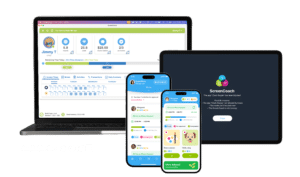
Sleep is essential for good physical and mental health. Not getting enough sleep can cause a number of issues, including a lowered immune system, difficulty concentrating, mood swings, and clumsiness. There are plenty more effects of lack of sleep, but you get the idea.
In young people, ongoing sleep deprivation is a huge contributor to a number of problems, perhaps one of the most important of which is their performance at (and even just their experience of) school. Australian Government health departments recommend young people aged 12–18 years get between 8 and 10 hours of sleep each night. However, most teens only get around 6.5–7.5 hours. There are a number of things that could be causing this, so it’s important to work out what those things are and address them to support your child in getting sufficient sleep.
What can happen without enough sleep?
Lack of sleep (especially chronic sleep deprivation) can lead to all sorts of issues. Your child may be experiencing some of these. The consequences of these may include:
- Mood swings, including aggressive behaviours such as lashing out at others
- Lack of concentration, making focus-reliant activities difficult (i.e. attention in class)
- Reduced ability to solve problems or make decisions
- Bingeing on junk food to increase their energy, because they end up with a lack of the latter
- Impaired ability to use equipment (not great in woodworking class) or drive a car
- Increased chances of skin issues, such as acne
- Decreased immunity, resulting in more frequent illness
Things that affect sleep quality
Some of the key factors influencing sleep length and quality for tweens and teens are:
Screen time
Use of screen-based devices, such as smart phones or tablets, is one of the problems most spoken about today. Not only do devices engage teens and tweens so much that they don’t want to get off them, they actually stimulate the brain in such a way that it makes it difficult to physically fall asleep immediately after using them. A study by VIC Health in association with the Sleep Health Foundation found that teenagers who stopped using their smart phones 1 hour prior to bedtime slept an average of 21 EXTRA minutes each night, or an additional 1 hour and 45 minutes per school week.
Hormones
Pre-teen and teenaged children experience hormonal changes that effectively alter their “body clock” – they ‘secrete melatonin later at night than they did in earlier childhood, which affects their circadian rhythms’ (Raising Children Network). This means they may not feel sleep at their usual bedtime and want to sleep later; as a result, they need to wake up later the next morning. The problem with this, is that school commitments (and sometimes comments implying laziness about “sleeping in”) don’t make it easy to get enough sleep within the boundaries of their bodies’ needs.
Schedule overloading
Extracurricular activities are necessary for stimulating young people’s brains and keep them active and fit. We all know there can be too much of a good thing, though, and this is often the case with teens’/tweens’ after-school and weekend schedules. Their time is jam-packed with stuff to do, that they have little time to rest and adopt good sleep habits.
Exposure to light
Light stimulates the brain and makes it want to stay awake by reducing the amount of the chemical melatonin the brain creates, which is crucial for sleep. In particular, any device emitting blue light will wake up the brain.
Sleep disorders
It isn’t uncommon for children and teenagers to suffer from sleep disorders. If your chid has sleep apnoea, for example, this is going to affect their amount and quality of sleep.
Supporting a healthy sleep routine
So, what can we do to help our kids get the amount of sleep they need? It’s not a quick fix, but it is a fairly simple one. If it’s not caused by a sleep disorder, then the problem is a combination of lifestyle and environmental factors.
Here are some of our suggestions for helping your teen or tween create a good sleep routine:
Sleep length and timing
Researchers have found that sleepiness at school depended more on WHEN teens slept rather than how many hours they slept (Melbourne Child Psychology & School Psychology Services). Remember that biological clock we were talking about? So, while teens do need 8-10 hours sleep, they also need it to align with what is comfortable for their bodies. Also, help them avoid long naps by setting a timer to 20 minutes – enough time to recharge but not enough to affect their night-time sleep!
Wake-up times
There’s nothing you can do about school times; so, letting your kids sleep in on the weekend isn’t a bad idea. You can never truly make up for lost sleep, but chronic sleep deprivation does leave a “backlog” of sleep that will eventually take its toll (perhaps unexpectedly, which isn’t great if they’re driving or doing something else equally risky). However, keeping wake-up times on the weekend within a couple of hours of school day wake-up times can help regulate your kids’ sleep clocks.
Environmental factors
Turn out the lights an hour before bed. Use blue light filters on all devices where possible, as this will reduce the stimulant effect on the brain. Encourage your kids to stop using their screen-based devices an hour before bed, to give their brains a chance to wind down. Help them come up with a relaxing way to end the day, perhaps suggesting some reading, sleep-friendly music, or stretching exercises.
There are many more things you can do to support your teens and tweens in getting the right amount of sleep, and there are plenty of resources out there dedicated to helping parents with just that. We hope that our suggestions help you get started on those lifestyle and environmental changes that will help your kids rest well and blossom.
REFERENCES
https://www.health.qld.gov.au/news-events/news/health-in-your-teens-sleep
https://www.betterhealth.vic.gov.au/health/healthyliving/teenagers-and-sleep
The Side-Effects of Teenage Sleepiness
https://raisingchildren.net.au/teens/healthy-lifestyle/sleep/sleep-teens
https://www.sleepfoundation.org/articles/teens-and-sleepSign up for ScreenCoach for $1 | Pricing Plans | Features Overview







